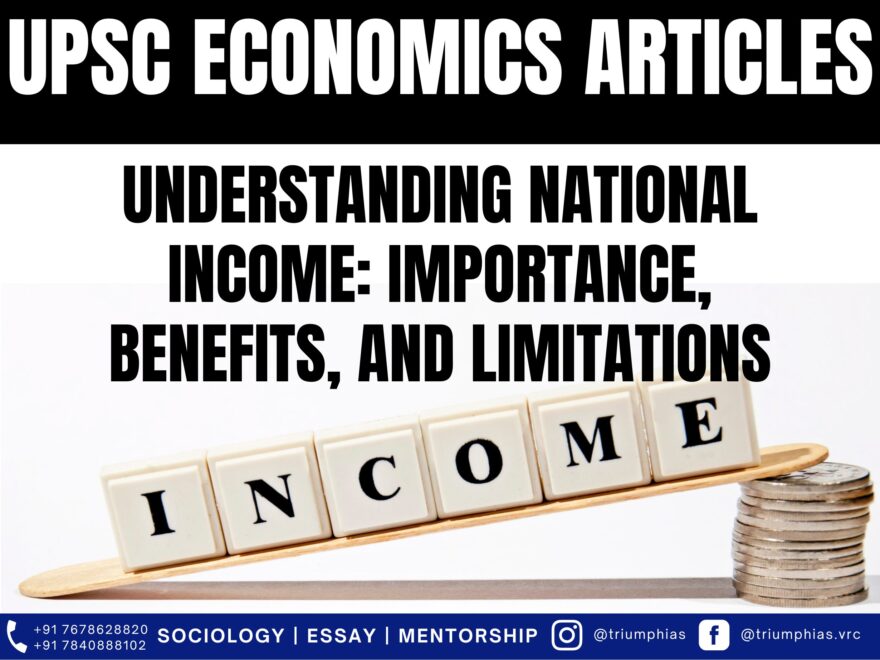National Income
(Relevant for Economics Section of General Studies Paper Prelims/Mains)

National Income
National income denotes the collective worth of all commodities and services manufactured within a nation’s boundaries over a specific timeframe (typically a year). This metric serves as a yardstick for assessing a country’s economic performance. It encompasses the entirety of earnings amassed by individuals, enterprises, and the government within the nation, and its computation can employ various methodologies like the production approach, expenditure approach, or value-added approach.
National income stands as a significant concept in the realm of macroeconomics and serves as a pivotal tool for policymakers when formulating judgments concerning economic expansion, advancement, and the equitable allocation of resources.
Various methods for determining national income encompass GDP (Gross Domestic Product), GNP (Gross National Product), and NNP (Net National Product), alongside other metrics like personal income and disposable income.
It’s imperative to recognize that national income does not encapsulate the entirety of earnings received by all citizens, but solely those incomes generated through active involvement in the production process.
Individuals contribute to the production process by providing the factors of production that they possess.
According to Marshall’s perspective, “The labor and capital within a country, combined with its natural resources, yield annually a specific net sum of both tangible and intangible commodities, encompassing all manner of services. This represents the authentic net annual income or revenue of the country, often referred to as the national dividend.” In this definition, the term ‘net’ pertains to deductions from the gross national income attributed to the wear and tear of machinery. Furthermore, income from overseas sources must be incorporated.
National income accounting equation is an equation that shows the relationship between income and expense of an economy and other categories. It is represented by the following equation:
Y = C + I + G + (X – M)
Where
Y = National income
C = Personal consumption expenditure
I = Private investment
G = Government spending
X = Net exports
M = Imports
The most important metrics that are determined by national income accounting are GDP, GNP, NNP, disposable income, and personal income. Let us know more about these concepts briefly in the following lines.
Benefits of national income
The significance of computing national income within an economy can be outlined as follows:
Indicator of Economic Performance: National income serves as an indicator of a nation’s economic performance, offering insights into its overall growth and development.
Influencing Economic Policies: National income figures play a pivotal role in shaping economic policies, including decisions concerning taxation, government expenditures, and trade.
Facilitating International Comparisons: The assessment of national income forms the foundation for comparing economic achievements among different countries, revealing their relative strengths and weaknesses.
Effective Resource Allocation: National income statistics aid in the efficient allocation of resources, enabling the identification of sectors requiring increased investment and promoting economic advancement.
Enabling Predictions: National income data serves as a basis for economic projections, enabling the anticipation of forthcoming economic patterns and challenges.
Empowering Employment Generation: The analysis of national income data allows for the examination of employment trends, enabling targeted interventions to foster greater job creation.
Determining Standard of Living: National income metrics contribute to gauging the populace’s standard of living, facilitating the development of strategies to enhance it by stimulating economic progress.
Supporting International Aid Efforts: International organizations utilize national income data to extend aid and support to nations confronting economic difficulties.
National Income Limitations
National income serves as a valuable tool for assessing a country’s economic performance, yet it is subject to certain limitations. Several constraints associated with national income are:
- Exclusion of Non-Monetary Transactions: National income solely encompasses monetary exchanges, disregarding non-monetary activities like unpaid household chores and volunteer work. These aspects, though significant for the economy, are not considered. Neglect of the Informal Sector: National income only focuses on formal sector engagements, ignoring contributions from the informal sector. This omission may result in an underestimation of a country’s actual economic activity.
- Omission of Quality of Life: National income fails to account for the populace’s quality of life. A nation with a high national income could still have a subpar quality of life due to factors like income inequality, inadequate living conditions, and insufficient basic amenities.
- Overlooking Environmental Impact: National income does not incorporate the environmental consequences of economic pursuits. It is feasible for a country to possess a substantial national income alongside elevated pollution levels and environmental deterioration.
- Inadequate Insight into Income Distribution: National income does not provide insights into income distribution within a country. A nation with a high national income may still experience substantial income inequality, leading to socio-economic challenges.
- Temporal Delay: The computation of national income entails a temporal delay, leading to potentially outdated data. This temporal lag can be problematic in swiftly evolving economies.
To master these intricacies and fare well in the Sociology Optional Syllabus, aspiring sociologists might benefit from guidance by the Best Sociology Optional Teacher and participation in the Best Sociology Optional Coaching. These avenues provide comprehensive assistance, ensuring a solid understanding of sociology’s diverse methodologies and techniques.
national income, GDP, GNP, NNP, disposable income, personal income, economic performance, macroeconomics, national income accounting, economic policies, resource allocation, standard of living, income inequality, environmental impact, economic advancement, Best Sociology Optional Coaching, Sociology Optional Syllabus.

Choose The Best Sociology Optional Teacher for IAS Preparation?
At the beginning of the journey for Civil Services Examination preparation, many students face a pivotal decision – selecting their optional subject. Questions such as “which optional subject is the best?” and “which optional subject is the most scoring?” frequently come to mind. Choosing the right optional subject, like choosing the best sociology optional teacher, is a subjective yet vital step that requires a thoughtful decision based on facts. A misstep in this crucial decision can indeed prove disastrous.
Ever since the exam pattern was revamped in 2013, the UPSC has eliminated the need for a second optional subject. Now, candidates have to choose only one optional subject for the UPSC Mains, which has two papers of 250 marks each. One of the compelling choices for many has been the sociology optional. However, it’s strongly advised to decide on your optional subject for mains well ahead of time to get sufficient time to complete the syllabus. After all, most students score similarly in General Studies Papers; it’s the score in the optional subject & essay that contributes significantly to the final selection.
“A sound strategy does not rely solely on the popular
Opinion of toppers or famous YouTubers cum teachers.”
It requires understanding one’s ability, interest, and the relevance of the subject, not just for the exam but also for life in general. Hence, when selecting the best sociology teacher, one must consider the usefulness of sociology optional coaching in General Studies, Essay, and Personality Test.
The choice of the optional subject should be based on objective criteria, such as the nature, scope, and size of the syllabus, uniformity and stability in the question pattern, relevance of the syllabic content in daily life in society, and the availability of study material and guidance. For example, choosing the best sociology optional coaching can ensure access to top-quality study materials and experienced teachers. Always remember, the approach of the UPSC optional subject differs from your academic studies of subjects. Therefore, before settling for sociology optional, you need to analyze the syllabus, previous years’ pattern, subject requirements (be it ideal, visionary, numerical, conceptual theoretical), and your comfort level with the subject.
This decision marks a critical point in your UPSC – CSE journey, potentially determining your success in a career in IAS/Civil Services. Therefore, it’s crucial to choose wisely, whether it’s the optional subject or the best sociology optional teacher. Always base your decision on accurate facts, and never let your emotional biases guide your choices. After all, the search for the best sociology optional coaching is about finding the perfect fit for your unique academic needs and aspirations.
To master these intricacies and fare well in the Sociology Optional Syllabus, aspiring sociologists might benefit from guidance by the Best Sociology Optional Teacher and participation in the Best Sociology Optional Coaching. These avenues provide comprehensive assistance, ensuring a solid understanding of sociology’s diverse methodologies and techniques. Sociology, Social theory, Best Sociology Optional Teacher, Best Sociology Optional Coaching, Sociology Optional Syllabus.
Best Sociology Optional Teacher, Sociology Syllabus, Sociology Optional, Sociology Optional Coaching, Best Sociology Optional Coaching, Best Sociology Teacher, Sociology Course, Sociology Teacher, Sociology Foundation, Sociology Foundation Course, Sociology Optional UPSC, Sociology for IAS,
Follow us :
🔎 https://www.instagram.com/triumphias
🔎https://www.youtube.com/c/TriumphIAS
https://t.me/VikashRanjanSociology
Find More Blogs
|
Scope of the subject and comparison with other social sciences |
|||
|
|
|
|
Modernity and social changes in Europe |

